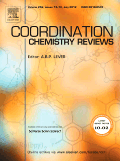
COORDINATION CHEMISTRY REVIEWS
metrics 2024
Advancing Knowledge in Coordination Chemistry
Introduction
COORDINATION CHEMISTRY REVIEWS is a premier academic journal published by ELSEVIER SCIENCE SA, specializing in the interdisciplinary field of coordination chemistry. Established in 1966 and running until 2025, the journal boasts an impressive reputation, having achieved Q1 quartile rankings in categories such as Inorganic Chemistry, Materials Chemistry, and Physical and Theoretical Chemistry. It holds a remarkable position in Scopus rankings, being ranked #1 in both Physical and Theoretical Chemistry and Inorganic Chemistry, indicating its significance within the field. With a focus on comprehensive reviews that synthesize existing knowledge and propose future research directions, COORDINATION CHEMISTRY REVIEWS serves as an invaluable resource for researchers, professionals, and students eager to stay at the forefront of coordination chemistry advancements. Although not open access, the journal is accessible through various academic institutions and libraries, ensuring that cutting-edge research is available to those who seek it.
Metrics 2024
 4.14
4.14 20.30
20.30 19.90
19.90 312
312Metrics History
Rank 2024
Scopus
IF (Web Of Science)
JCI (Web Of Science)
Quartile History
Similar Journals
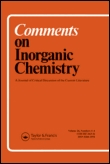
COMMENTS ON INORGANIC CHEMISTRY
Bridging Theory and Practice in Inorganic ChemistryCOMMENTS ON INORGANIC CHEMISTRY is a prestigious academic journal published by Taylor & Francis Ltd, specializing in the dynamic field of inorganic chemistry. With an impressive impact factor placing it in the Q1 category, this journal ranks #6 out of 79 in its field, reflecting its high influence and contribution to the discipline, with a remarkable percentile ranking of 93rd. Since its inception in 1981 and spanning publications until 2024, this journal serves as a crucial platform for researchers, professionals, and students to disseminate groundbreaking findings, review articles, and discussions on contemporary topics in inorganic chemistry. Although it is not an Open Access journal, the rigorous peer-review process ensures the publication of high-quality research. By bridging theoretical and practical aspects of inorganic chemistry, COMMENTS ON INORGANIC CHEMISTRY remains an essential resource for advancing knowledge and fostering innovation within the scientific community.
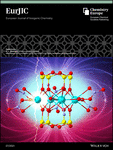
EUROPEAN JOURNAL OF INORGANIC CHEMISTRY
Showcasing Excellence in Inorganic ResearchThe EUROPEAN JOURNAL OF INORGANIC CHEMISTRY, published by WILEY-V C H VERLAG GMBH, is a premier peer-reviewed journal dedicated to advancing the field of inorganic chemistry. With an ISSN of 1434-1948 and an E-ISSN of 1099-0682, this journal has established itself as a key platform for the dissemination of innovative research, reviews, and features since its inception. As of 2023, it holds a respectable Q2 quartile ranking in the domain of inorganic chemistry, reflecting its influence and contribution to the scientific community—ranking #33 out of 79 in Scopus’ assessment and placing the journal in the 58th percentile. The journal encompasses a wide range of topics within inorganic chemistry, making it a valuable resource for researchers, professionals, and students alike. Although the journal does not currently offer open access, it remains an essential outlet for high-quality, impactful studies in inorganic chemistry, showcasing significant advancements and fostering collaboration among scholars globally.

CHINESE JOURNAL OF ORGANIC CHEMISTRY
Exploring the Frontiers of Organic CompoundsThe Chinese Journal of Organic Chemistry, published by Science Press, serves as a pivotal platform for advancing the field of organic chemistry since its inception in 1996. With an ISSN of 0253-2786, this esteemed journal provides robust scientific contributions, reflecting significant advancements and novel findings that are crucial to the organic chemistry community. As of 2023, it is categorized in the Q3 quartile of organic chemistry journals, positioning it within the competitive landscape of this vibrant research area, ranking #147 out of 211 in Scopus, corresponding to a 30th percentile ranking. The journal is committed to fostering a scholarly exchange of ideas and research, making it an essential resource for researchers, professionals, and students dedicated to exploring the complexities and applications of organic compounds. The Chinese Journal of Organic Chemistry continues to support the dissemination of high-quality research that contributes to both local and global scientific endeavors.

Chemistry-Switzerland
Connecting Chemists Worldwide Through Open AccessChemistry-Switzerland is an esteemed, fully Open Access journal published by MDPI, dedicated to advancing research in a broad spectrum of chemistry disciplines. Launched in 2019, the journal has established itself within the academic community, particularly as it spans critical areas such as inorganic and organic chemistry, as well as electrochemistry. Recognized for its contributions, it has achieved notable rankings, including Q2 status in Chemistry (miscellaneous) and Inorganic Chemistry, and Q3 standing in Electrochemistry and Organic Chemistry for 2023. With a commitment to disseminating high-quality research, Chemistry-Switzerland serves as an invaluable resource for researchers, professionals, and students aiming to share their discoveries with a global audience. Located in Basel, Switzerland, this journal facilitates seamless access to cutting-edge research, fostering innovation and collaboration within the vibrant field of chemistry. With this dynamic platform, the journal aims to continue its trajectory of growth and impact, inspiring the next generation of chemists.
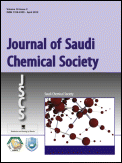
Journal of Saudi Chemical Society
Advancing Chemistry Knowledge, One Article at a Time.The Journal of Saudi Chemical Society, published by ELSEVIER, stands as a premier platform for advancing knowledge in the field of chemistry. Since its inception in 2009, this Open Access journal has garnered significant attention, securing a prestigious Q1 ranking in the Chemistry (miscellaneous) category for 2023, reflecting its position among the top journals in the discipline. With an impressive Scopus ranking of #66 out of 408 in General Chemistry, this journal boasts a commendable 83rd percentile, underscoring its impact and relevance in the global research community. The journal aims to disseminate high-quality research articles, reviews, and case studies, fostering innovation and collaboration among chemists and allied professionals. By enabling widespread access to cutting-edge research, the Journal of Saudi Chemical Society plays a crucial role in supporting the educational and professional development of students, researchers, and practitioners alike, making it an essential resource for anyone invested in the dynamic field of chemistry.
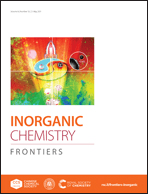
Inorganic Chemistry Frontiers
Exploring New Frontiers in Inorganic ChemistryInorganic Chemistry Frontiers, published by the esteemed Royal Society of Chemistry, stands at the forefront of advancements in the field of inorganic chemistry, boasting a prestigious Q1 ranking in its category as of 2023 and an impressive Scopus Rank of #3 out of 79, placing it in the 96th percentile. Since its inception in 2014, this journal has provided a robust platform for high-quality research that spans the diverse and rapidly evolving areas of inorganic chemistry. As an open-access journal, it ensures that the findings presented are readily accessible to researchers, educators, and practitioners globally, fostering an inclusive environment for the dissemination of knowledge. With its rigorous peer-review process, Inorganic Chemistry Frontiers aims to facilitate interdisciplinary dialogue and innovation, making it an essential resource for anyone dedicated to exploring the myriad applications and theoretical advancements within inorganic chemistry.
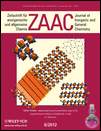
ZEITSCHRIFT FUR ANORGANISCHE UND ALLGEMEINE CHEMIE
Exploring the Depths of Inorganic ChemistryZEITSCHRIFT FUR ANORGANISCHE UND ALLGEMEINE CHEMIE, published by WILEY-V C H VERLAG GMBH, is a pivotal journal in the field of inorganic chemistry, catering to the needs of researchers, professionals, and students seeking to advance their understanding of this dynamic discipline. With its historical roots dating back to 1892 and a commitment to high-quality research, this journal provides a platform for the dissemination of significant findings related to inorganic substances and their general chemistry. Although currently not an open-access journal, it holds a competitive position with an impact factor placing it in the Q3 quartile of the Inorganic Chemistry category, ranking #57 out of 79 in Scopus. Situated in Germany, this journal not only connects past and present research endeavors but also aims to foster innovation and collaboration within the inorganic chemistry community. Whether you are exploring fundamental concepts or groundbreaking applications, ZEITSCHRIFT FUR ANORGANISCHE UND ALLGEMEINE CHEMIE remains an invaluable resource for advancing chemical sciences.

JOURNAL OF CHEMICAL RESEARCH
Cultivating Excellence in Chemical Scholarship.JOURNAL OF CHEMICAL RESEARCH, published by SAGE PUBLICATIONS LTD, serves as a pivotal platform for scholars and practitioners in the field of Chemistry. With its ISSN 1747-5198 and E-ISSN 2047-6507, this journal has established itself as a reliable source of innovative research since its inception in 2000. The journal's comprehensive scope encompasses various facets of chemical research, providing a broad spectrum of articles that foster scientific advancement and technological innovation. Ranked in the Q3 tier of miscellaneous chemistry journals in 2023, with a Scopus rank of #246 out of 408, it represents a solid outlet for emerging and established researchers alike. Although currently not an open-access journal, its rigorous peer-review process ensures that only high-quality studies are published, catering to the academic and professional community's demand for credible and impactful findings. Positioned in the vibrant research landscape of the United Kingdom, the JOURNAL OF CHEMICAL RESEARCH is dedicated to expanding the frontiers of chemical sciences and is an essential resource for anyone committed to advancing this dynamic field.

RUSSIAN JOURNAL OF INORGANIC CHEMISTRY
Bridging Disciplines in Inorganic and Materials ScienceThe Russian Journal of Inorganic Chemistry is a distinguished publication that delves into the fundamental and applied aspects of inorganic chemistry. Published by MAIK Nauka/Interperiodica/Springer, this journal has established itself as a vital resource for researchers, professionals, and students alike, contributing significantly to the fields of Inorganic Chemistry, Materials Science, and Physical and Theoretical Chemistry. With an ISSN of 0036-0236 and an E-ISSN of 1531-8613, the journal is indexed for easy access and citation. Though the journal currently operates under a subscription model, its commitment to disseminating high-quality research and fostering scientific discourse remains steadfast. The journal has been maintaining a consistent record since its inception, and its positioning in the Q3 quartile across various chemistry categories in 2023 underscores its relevance in the academic community. As it continues through its converged years from 1996 to 2024, the Russian Journal of Inorganic Chemistry plays a pivotal role in enhancing the understanding and advancement of inorganic chemistry, making it an indispensable tool for anyone engaged in this dynamic field.

CHINESE JOURNAL OF STRUCTURAL CHEMISTRY
Pioneering Research in Chemical StructuresThe CHINESE JOURNAL OF STRUCTURAL CHEMISTRY, published by Elsevier, stands as a vital resource in the field of structural chemistry, notably contributing to the advancement of knowledge since its inception in 1996. With its ISSN 0254-5861 and E-ISSN 0254-5861, the journal has established a firm reputation, garnering a Q2 ranking in the 2023 Chemistry (miscellaneous) category, which highlights its influence in the academic community (rank #155/408, 62nd percentile in Scopus). This journal serves as an invaluable platform for researchers and professionals by disseminating high-quality research findings, theoretical studies, and applied methodologies that address both fundamental aspects and emerging trends in structural chemistry. With contributions from distinguished scholars, it aims to foster innovation and collaboration, while providing a space for novel discoveries in the field. Although it does not currently offer Open Access, its robust content continues to attract a diverse readership eager to engage with cutting-edge scientific developments.